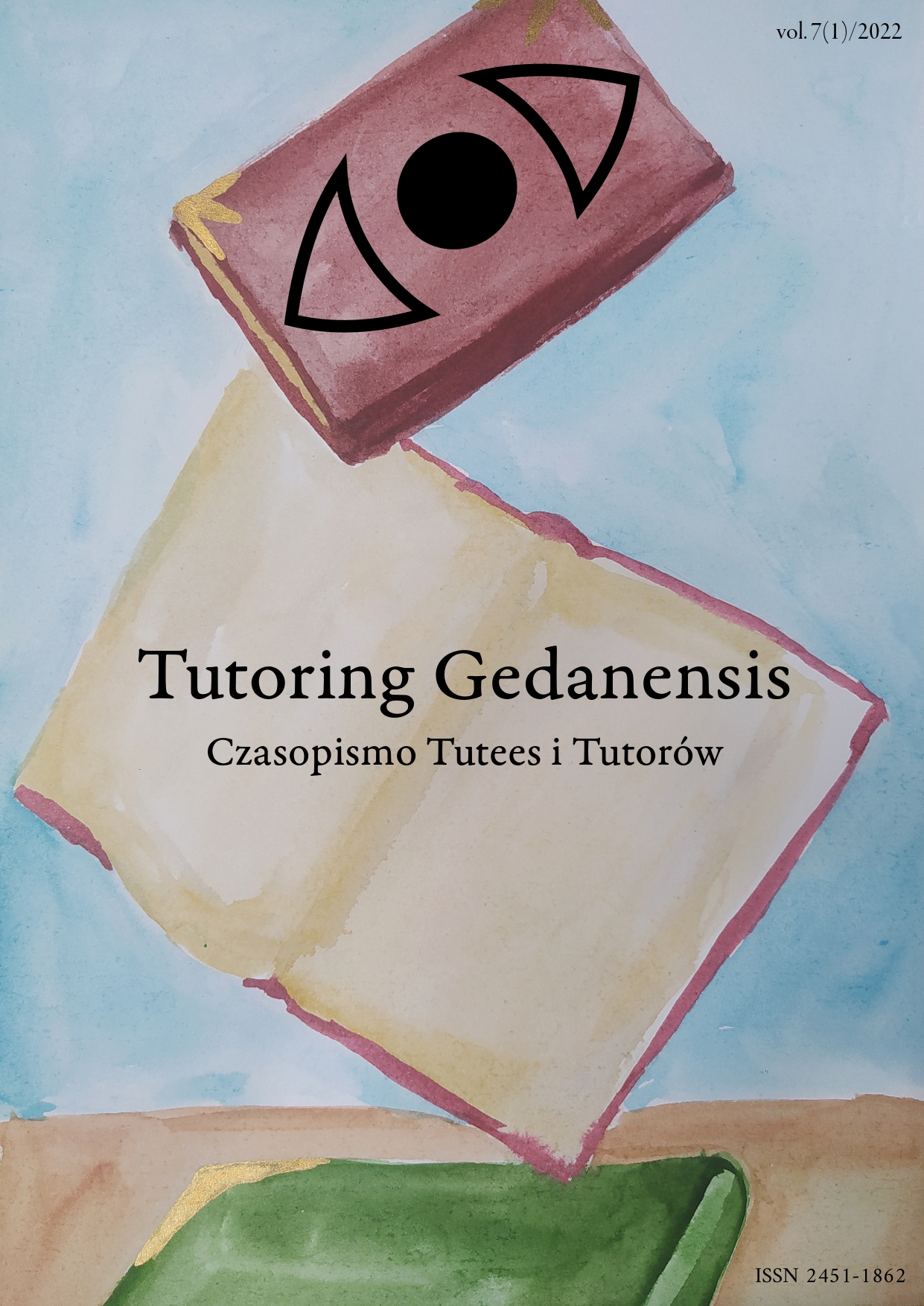Twórczość Mariusza Szczygła w perspektywie studiów interkulturowych. "Gottland" i "Zrób sobie raj"
DOI:
https://doi.org/10.26881/tutg.2022.1.09Słowa kluczowe:
interkulturowość, reportaż, postsekularyzm, Inny, Mariusz SzczygiełDownloads
Bibliografia
Bolten J., Interkulturowa kompetencja, tytuł oryginału: Interkulturelle Kompetenz, przekł. Andrzejewski B., Wydawnictwo Naukowe UAM, Poznań 2006.
Darska B., Pamięć codzienności, codzienność pamiętania. Szkice o reportażu polskim XXI wieku, wyd. I, Wydawnictwo Naukowe Katedra, Gdańsk 2014.
Gemziak Ł., „Lustro, którego sami nie potrafilibyśmy sobie podstawić”. Czeska recepcja „Gottlandu” Mariusza Szczygła, „Bohemistyka” 2015, nr 1.
Horodecka M., Pośrednicy. Współczesny reportaż literacki wobec Innego, TAiWPN UNIVERSITAS, Kraków 2020.
Jarzyńska K., Postsekularyzm – wyzwanie dla teorii i historii literatury (rozpoznanie wstępne), „Teksty Drugie. Teoria literatury, krytyka, interpretacja”, nr 1/2 (133-134), 2012.
Kaczorowski A., Czapliński P., New Polish Idiom (Mariusz Szczygieł), [w:] Czapliński P., Niżyńska J., Polakowska A., Trojanowska T., Being Poland. A New History of Polish Literature and Culture since 1918, University of Toronto Press 2018.
Krajka J., Mackiewicz M., Wilczyńska W., Komunikacja interkulturowa. Wprowadzenie, Wydawnictwo Naukowe UAM, Poznań 2019.
Rybicka E., „Travelebrity” – markowanie dyskursu podróżniczego, [w:] Kulturowa teoria literatury. Poetyki, problematyki, interpretacje, red. Nycz R., Walas T., t.2, Universitas, Kraków 2012.
Sendyka R., Poetyka kultury: propozycje Stephena Greenblatta, [w:] Kulturowa teoria literatury 2. Poetyki, problematyki, interpretacje, red. Nycz R., Walas T., TAiWPN UNIVERSITAS, Kraków 2012.
Szczygieł M., Gottland, wyd. III, Wydawnictwo Czarne, Wołowiec 2016.
Szczygieł M., Láska nebeská, wyd. II uzupełnione, Wydawnictwo Agora, Warszawa 2020.
Szczygieł M., Zrób sobie raj, wyd. III, Wydawnictwo Dowody na Istnienie, Warszawa 2019.
Źródła internetowe:
Cambridge Dictionary, hasło: bias: https://dictionary.cambridge.org/dictionary/english-polish/bias, [dostęp: 29.05.2021].
Nalewajk Ż., Jak powstawał „Gottland” – tajniki warsztatu reportażysty. Rozmowa z Mariuszem Szczygłem, „Tekstualia” nr 1 (12), 2008: https://tekstualia. pl/files/30049ca6/jak_powstawal_gottland.pdf [dostęp: 9.04.2021].
Narodowe Archiwum Cyfrowe. Archiwa państwowe, Lida Baarova, aktorka filmowa. Fotografia portretowa, sygnatura: 1-M-1958: https://audiovis. nac.gov.pl/obraz/183968/, [dostęp: 22.04.2021].
Netflix, The Devil’s Mistress (tytuł oryginalny: Lída Baarová), reż. Filip Renč, 2016: https://www.netflix.com/pl/title/80157564, [dostęp: 23.04.2021 r].
(Post)secular: Imagining faith in contemporary cultures. An International, interdisciplinary conference, University of Wawrick and Coventry Cathedral, 8- 10 czerwca 2017 r.: https://warwick. ac.uk/fac/arts/modernlanguages/research/german/conferences/po stsecular/ [dostęp: 27.05.2021].
Stojanova C., Czech Dream and the Mission of Documentary Cinema: A Conversation with Helena Třeštíkova, 2006, http://www.kinokultura.com/specials/4/stojanova-trestikova.shtml [dostęp: 28.04.2021].
USC Shoah Foundation, Holocaust Survivor Věra Saudková (Czech w/ English subtitles), aplikacja Facebook, post z 15 maja 2012 r, https://www.facebook.com/USCSFI/videos/3296040127807/ [dostęp: 30.04.2021 r].
Aneks
Cambridge Dictionary, hasło: bias, źródło: https://dictionary.cambridge.org/ dictionary/english-polish/bias, [dostęp: 29.05.2021]. tekst oryginału: „a situation in which you support or oppose someone or something in an unfair way because you are influenced by your personal opinions”.
Kaczorowski A., Czapliński P., New Polish Idiom (Mariusz Szczygieł), [w:] Czapliński P., Niżyńska J., Polakowska A., Trojanowska T., Being Poland. A New History of Polish Literature and Culture since 1918, University of Toronto Press 2018, str. 666. Tekst oryginału: „The erasure of prohibitions and precepts that generate a sense of shame for one's own body and for personal sexual proclivities, the neutralization of pathos related to belonging to an imagined community, and the loosening of bonds with the deceased are thus revealed as four steps on the road to paradise. This is why Szczygieł's book can be treated as post-secular reportage: it presents a society that believes in path to collective happiness that sidesteps God and violence.”
Stojanova C., Czech Dream and the Mission of Documentary Cinema: A Conversation with Helena Třeštíkova, 2006, źródło: http://www.kinokultura. com/specials/4/stojanova-trestikova. shtml, [dostęp: 28.04.2021]. tekst oryginału:” When we were shooting the Baarová film, she was very reserved and tried to avoid all mention of her relationship with Goebbels, which was actually a turning point in her life, and it remained unspoken of throughout the film, although this notorious affair ruined her career and her life. (…) when the shooting was over and I was back in the Czech Republic, she kept calling me, begging me to return and film “some important things” that she had failed to mention in our conversations. Unfortunately, this was impossible financially, and soon after she died… So there was no way for me to follow up on her tragic fate.”
USC Shoah Foundation, Holocaust Survivor Věra Saudková (Czech w/ English subtitles), źródło: aplikacja Facebook, post z 15 maja 2012 r, https://www.facebook.com/USCSFI/ videos/3296040127807/ [dostęp: 30.04.2021]. tekst oryginału:” Franz Kafka is that writer, yes. But he became famous only after his death and actually only after the death of his entire family. Nobody in the family really knew he was a writer. They could not even imagine he might become famous. His friend Max Brod used to tell my grandpa: Mr. Kafka, your son is a writer! Bud grandpa had no respect for writers. The family thought this was just some hobby of Franz. That he writes in the evenings. During the day he worked in the office. As a lawyer. And then he got sick and died. (…) When my mother and her sisters were still alive leaving in a transport they did not know how famous he will be.”

 Uniwersyteckie Czasopisma Naukowe
Uniwersyteckie Czasopisma Naukowe



